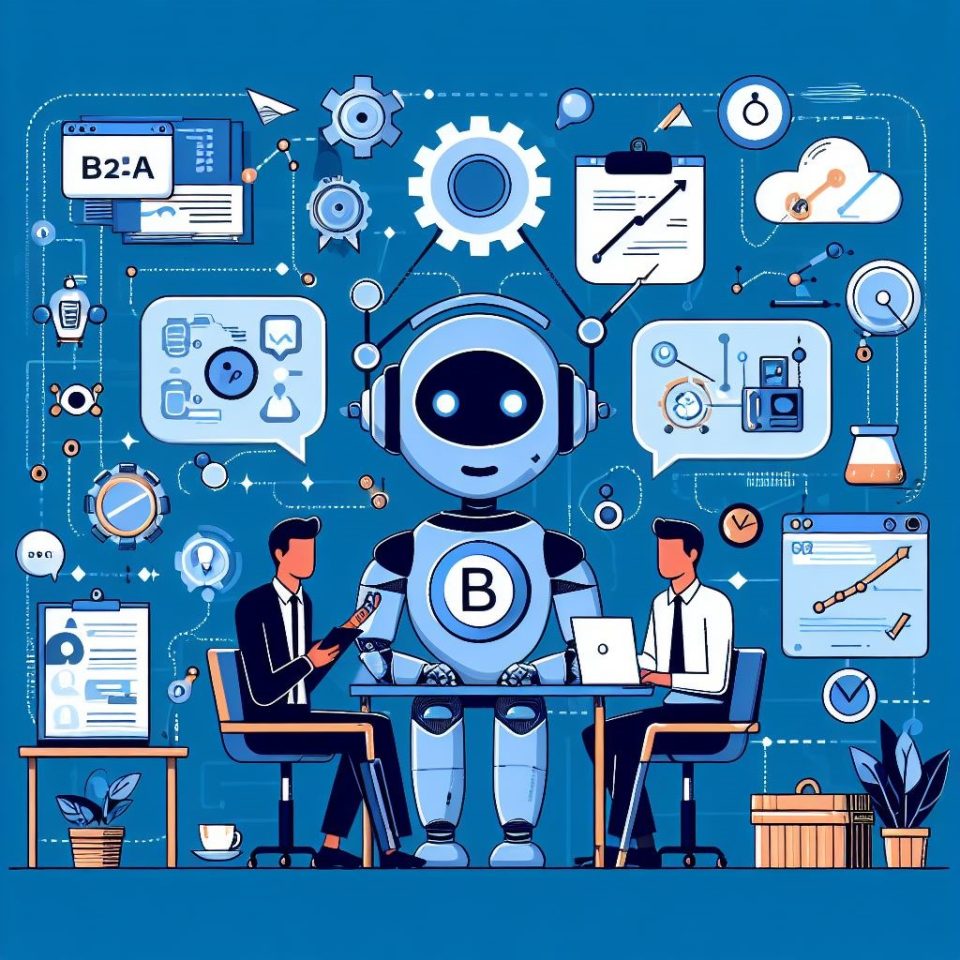Have you ever wished for a robot to help make your business communication easier?
An AI chatbot does exactly that. It has turned client interaction into a breeze for businesses. This is true for interactions as well. These chatbots are built using AI, ML, and NLP technologies to help businesses turn communication effortless. They help resolve companies’ queries no matter what time of the day it is.
The best part about implementing a chatbot for B2B interactions is that you never feel like you are interacting with tech as the conversations are personalised. In fact, you can integrate WhatsApp chatbot to interact with businesses in a very personalised manner. This article talks about how you can implement AI chatbots to help with your B2B interactions. Keep on reading to learn more.
What are B2B Chatbots?
These bots are creative virtual assistants explicitly made for business interactions. B2B chatbots use advanced technologies. They include artificial intelligence, machine learning, and natural language processing. These smart bots are carefully designed to make communication easy and smooth. There are two things B2B Chatbots are used for:
- A B2B AI chatbot uses artificial intelligence and machine learning technologies to understand and reply to queries from other companies intelligently so that they seem personal.
- The B2B chatbots work as Online chatbots to give B2B clients quick support. These online B2B chatbots function as interactive tools that are smoothly integrated into marketing plans. This is called chatbot marketing.
5 Key Benefits of Using AI Chatbots in B2B
Here are some of the primary benefits of using AI chatbots in B2B settings.
Better Efficiency
Artificial intelligence chatbots handle repetitive operations. It can include tasks like processing orders and responding to frequently asked questions. It speeds up business procedures. Chatbots take care of these repetitive responsibilities. They free up important human resources. This, in turn, helps employees focus on more strategic tasks. Thus, businesses benefit from increased productivity and lower operating expenses.
Data Insights
Artificial intelligence chatbots analyse consumer interactions to offer helpful information about customer behaviour and preferences. Businesses can learn more about their client’s requirements and desires by gathering and evaluating data from these interactions. Businesses can successfully predict client needs, make well-informed decisions, and adapt their plans. AI chatbots can also spot patterns and trends in customer interactions that human agents would miss. It can offer insightful information for streamlining corporate procedures and improving client experiences.
Cost Effective
Businesses can substantially cut down on the overhead expenses of keeping big customer care personnel by implementing AI chatbots to answer customer concerns 24/7. Artificial intelligence (AI) chatbots are an affordable substitute for human agents to help clients because they don’t need pay, benefits, or vacation time. Also, chatbots may respond to several questions at once, which reduces the need for additional employees.
Personalized Interactions
AI chatbots can provide personalised answers, suggestions, and support by personalising conversations based on user data. Chatbots can provide clients with extremely relevant and customised experiences. It uses user data and previous interactions to do so. Chatbots with AI integration can improve customer satisfaction and loyalty. They recommend products based on previous purchases or offer customised support based on specific concerns.
24/7 Availability
Unlike human agents, artificial intelligence chatbots are always active. This means that they can reply to customer inquiries day or night. Being available around the clock improves consumer convenience and satisfaction, which raises loyalty and retention rates. Customers can count on AI chatbots to deliver timely help and support whenever they need it, including during and after office hours.
How to Implement AI Chatbots on B2B?
AI chatbot use in business-to-business settings requires careful planning and execution for the best productivity and smooth integration. To successfully integrate this kind of chatbot into your B2B workflows, follow these key steps:
Define your Goals
Setting exact objectives and goals for the AI chatbot integration into your B2B processes is a good place to start. Having well-defined goals can help you plan your implementation approach and guarantee its success. You can decide which key performance indicators (KPIs), such as response time, client satisfaction, and conversion rates, will be used to measure how well your AI chatbot installation is doing.
Use the Right Platforms
Select AI chatbot systems that meet the demands of your sector, your business, and your financial situation. Choose the platform that best meets the needs of your company by weighing your options according to functionality, scalability, integration potential, and customization capabilities. To guarantee a seamless implementation procedure, look for these elements:
- Vendor’s support services
- Installation options
- Ease of use
- Availability of online chatbot
Integrate with Existing Systems
Improving AI chatbot efficiency and efficacy in business-to-business contexts requires seamless interaction with current systems, including a CRM tool, ERP system, and customer database. To reduce interruption and ensure a seamless transition, make sure the chatbot solution you have chosen can interface with your current infrastructure seamlessly. To create a strong integration plan and take care of any compatibility problems that might come up throughout the installation phase, work closely with your IT staff or technology partners.
Develop Training Data
Giving useful information to AI chatbots is important for guaranteeing accurate responses and efficient B2B client contact. To help chatbots comprehend and reply to inquiries, collect and organize training data from a variety of sources, such as client inquiries, past transactions, product catalogs, and industry-specific knowledge base. Use machine learning to enhance chatbot functionality over time and hone responses to user interactions and real-time feedback.
Customize for B2B Needs
AI chatbots can be designed to handle particular needs and problems that occur during business-to-business (B2B) interactions, like complicated product questions, requests for technical support, or purchasing processes. Workflows, conversation flows, and responses from chatbots can be tailored to comply with industry standards and B2B best practices. When developing and deploying chatbot solutions for B2B environments, take into account variables, including industry regulations, compliance needs, and client preferences.
Add Multilingual Support
Do you want to cater to various B2B clients and expand your AI chatbot’s worldwide reach and accessibility? Then, you must add multilingual features. Multilingual chatbots help you to communicate with customers from around the globe. They help overcome language barriers and increase your company’s worldwide reach. Ensure your chatbot platform supports a variety of languages and dialects. This will let consumers in various locations receive accurate and culturally sensitive responses. You can also consider investing in language translation services or natural language processing skills.
You can learn more about chatbot implementation through this video.
The Real Benefit of AI Chatbot
AI chatbots offer a variety of benefits. It includes increased productivity and cost-effectiveness. Your business can find new avenues for growth and success in the highly competitive world of business-to-business commerce by using AI chatbots. AI chatbots have the potential to be useful tools that promote efficiency and company expansion in B2B settings with proper design and strategic implementation.




